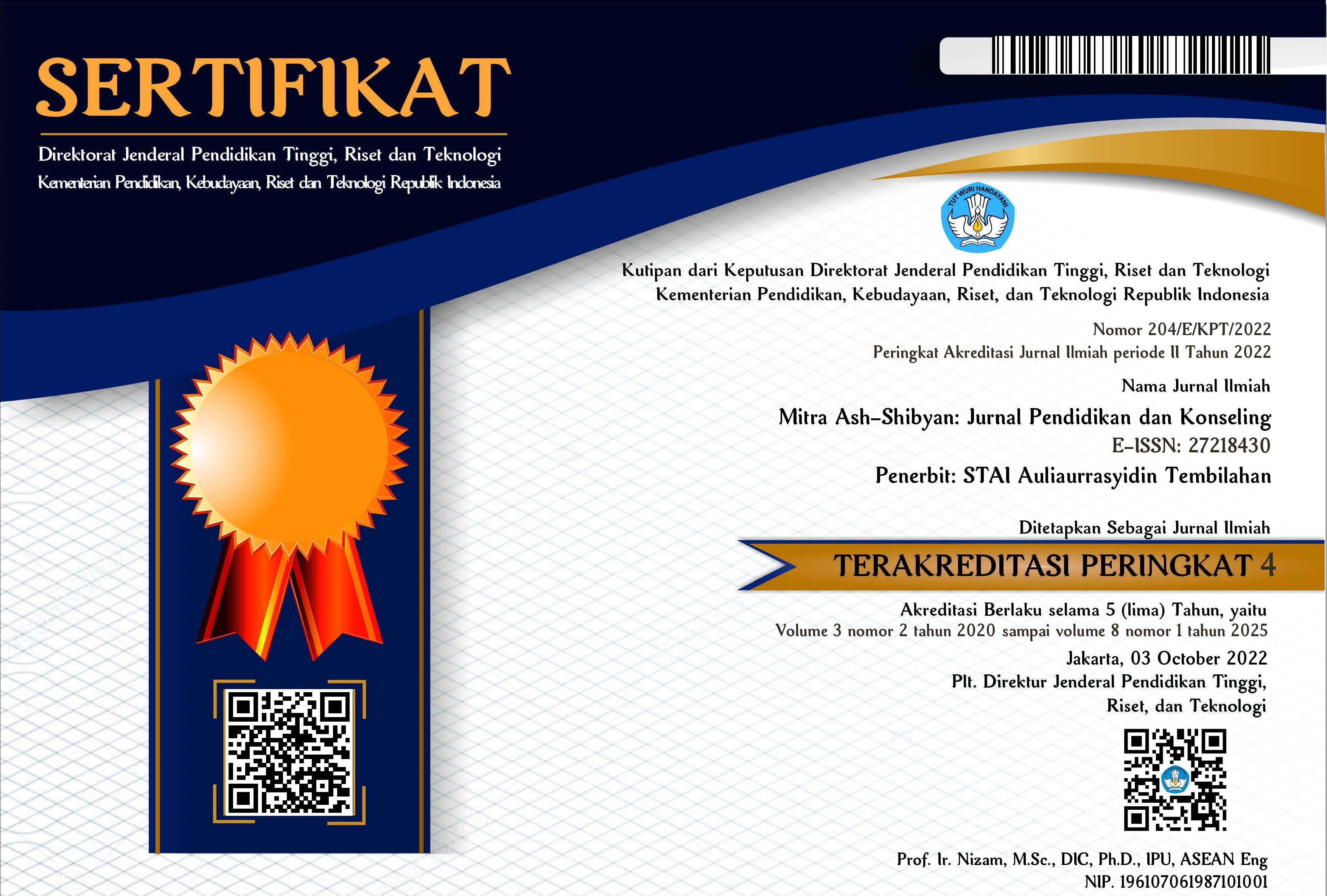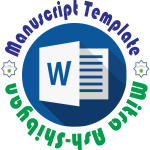Strategi Pembelajaran di Era Postmodern: Peningkatan Hasil Belajar Melalui Pendekatan Active Learning pada Generasi Digital Native
DOI:
https://doi.org/10.46963/mash.v7i01.1461Keywords:
Active learning, Digital native, Post-modernAbstract
Motivation, from time to time, including the postmodern era, becomes one of the success factors in learning. However, today, student motivation is low, which has a major impact on students learning outcomes. Accordingly, teachers need to use various strategies to motivate students in learning in order to get maximum learning results. This study aims to describe the right strategy to overcome the boredom of students of digital native generation so that literacy index and learning outcomes increase, especially in Islamic Education for students at the kindergarten level. This study used a qualitative method with the type of phenomenology, in which researchers tried to understand understand the behavior, motivation, perception, and action of the research subjects. The data collection techniques used were interviews, observation and documentation. The results of this study show that active learning strategies are very relevant to improve student learning outcomes and can encourage student learning motivation. The learning process is carried out through games, quiz, verse connection games, index card matches, discussions, and questions-answers.
Downloads
References
Abbas, Z., Adawiyah, R., I. A. (2022). Upaya Meningkatkan Hasil Belajar Siswa Pada Mata Pelajaran Akidah Akhlak Menggunakan Metode Diskusi di MA Manbaul Hikam Tegalmojo Kecamatan Tegalsiwalan Kabupaten Probolinggo. Jurnal Pendidikan dan Konseling (JPDK), 4(1). https://doi.org/10.31004/jpdk.v4i1.3757
Aini, J., & Junaidi, J. (2021). Motif Guru Memilih Metode Ceramah dalam Pembelajaran Sosiologi di SMAN 13 Padang. Jurnal Sikola: Jurnal Kajian Pendidikan dan Pembelajaran, 2(3), 162-173. https://doi.org/10.24036/sikola.v2i3.105
Amaliah, R. R., Fadhil, A., & Narulita, S. (2014). Penerapan Metode Ceramah dan Diskusi dalam Meningkatkan Hasil Belajar PAI di SMA Negeri 44 Jakarta. Jurnal Studi Al-Qur’an, 10(2), 119 - 131. Retrieved from https://journal.unj.ac.id/unj/index.php/jsq/article/view/4441
Anggorowati, N. P. (2013). Penerapan Model Pembelajaran Tutor Sebaya pada Mata Pelajaran Sosiologi. KOMUNITAS: International Journal of Indonesian Society and Culture, 3(1), 103–120. https://doi.org/10.15294/komunitas.v3i1.2303
Hajaroh, M. (2010). Paradigma, Pendekatan dan Metode Penelitian Fenomenologi. Jurnal Pendidikan Universitas Negeri Yogyakarta, 1-21.
Ilham, I. (2018). Paradigma Postmodernisme; Solusi untuk Kehidupan Sosial? Sebuah Pandangan Teoritis dan Analitis terhadap Paradigma Postmodernisme. Jurnal Sosiologi USK: Media Pemikiran & Aplikasi, 12(1), 1–23. Retrieved from https://jurnal.usk.ac.id/JSU/article/view/11693
Jainiyah, J., Fahrudin, F., Ismiasih, I., & Ulfah, M. (2023). Peranan Guru dalam Meningkatkan Motivasi Belajar Siswa. Jurnal Multidisiplin Indonesia, 2(6). https://doi.org/10.58344/jmi.v2i6.284
Karlina, K., Faqih, I. T., Narini, N. A., Hidayat, H., Hidayat, H., & Mulyani, H. (2020). Peningkatan Kualitas Hasil Belajar Pendidikan Kewarganegaraan di Sekolah Dasar Kelas Tinggi dengan Menggunakan Strategi Pembelajaran Aktif Tipe Crossword Puzzle. JEMARI (Jurnal Edukasi Madrasah Ibtidaiyah), 2(1). https://doi.org/10.30599/jemari.v2i1.583
Kusuma, R. N., & Inayati, N. L. (2023). Penerapan Strategi Pembelajaran Aktif dalam Meningkatkan Motivasi Belajar Mata Pelajaran PAI di SMP Muhammadiyah 7 Banyudono. Edukasi Islami: Jurnal Pendidikan Islam, 12(2), 1377–1390. https://jurnal.staialhidayahbogor.ac.id/index.php/ei/article/view/3854
Lutfiah, V. L., & Sa’diyah, M. (2019). Peningkatan Motivasi Belajar dengan Menerapkan Strategi Pembelajaran Everyone is a Teacher Here pada Mata Pelajaran PAI di SMAN 2 Bogor. E-Jurnal Mitra Pendidikan, 3(4), 496-506.
Malik, R. S. (2018). Educational Challenges in 21st Century and Sustainable Development. Journal of Sustainable Development Education and Research, 2(1), 9. https://doi.org/10.17509/jsder.v2i1.12266
Nurdyansah, & Toyiba, F. (2018). Pengaruh Strategi Pembelajaran Aktif terhadap Hasil Belajar Madrasah Ibtidaiyah. Jurnal Pendidikan Islam, 3(1).
Oliver, R. (2021). Pengertian Pendidikan Kewarganegaraan. Angewandte Chemie International Edition, 6(11), 951–952., (22).
Parisa, M., Arcana, I. N., Susetyo, A. E., & Kuncoro, K. S. (2023). Pengembangan Kuis dan Game Edukasi Menggunakan Wordwall pada Pembelajaran Daring Pertidaksamaan Nilai Mutlak Bentuk Linier. Jurnal Theorems (The Original Research of Mathematics), 7(2). https://doi.org/10.31949/th.v7i2.4351
Putra, P. (2017). Hubungan Metode Bermain, Cerita, dan Menyanyi (BCM) dengan Prestasi Belajar Siswa SD menurut Persepsi Mahasiswa UIN Maulana Malik Ibrahim Malang. Modeling: Jurnal Program Studi PGMI, 4(2), 147–161.
Sirait, E. D., & Apriyani, D. D. (2020). Pengaruh Penggunaan Strategi Pembelajaran Aktif ICM (Index Card Match) terhadap Hasil Belajar Matematika. JPMI (Jurnal Pendidikan Matematika Indonesia), 5(1). https://doi.org/10.26737/jpmi.v5i1.1710
Suharni, S. (2021). Upaya Guru dalam Meningkatkan Motivasi Belajar Siswa. G-Couns: Jurnal Bimbingan dan Konseling, 6(1). https://doi.org/10.31316/g.couns.v6i1.2198
Wicaksono, I., Aprilia, I., & Supraptiningsih, I. K. (2022). Penerapan Asesmen Formatif Pembelajaran Fisika dengan Kuis Game Edukasi dan Penilaian Diri Siswa SMA. Education Journal : Journal Educational Research and Development, 6(2). https://doi.org/10.31537/ej.v6i2.739
Downloads
Published
Issue
Section
License
Copyright (c) 2024 Boini, Sahrul, Wahab, Syamsul Kurniawan

This work is licensed under a Creative Commons Attribution-ShareAlike 4.0 International License.
Authors who publish with this journal agree to the following terms:
1. Copyright on any article is retained by the author(s).
2. The author grants the journal, right of first publication with the work simultaneously licensed under a Creative Commons Attribution shareAlike 4.0 International License that allows others to share the work with an acknowledgment of the work’s authorship and initial publication in this journal.
3. Authors are able to enter into separate, additional contractual arrangements for the non-exclusive distribution of the journal’s published version of the work (e.g., post it to an institutional repository or publish it in a book), with an acknowledgment of its initial publication in this journal.
4. Authors are permitted and encouraged to post their work online (e.g., in institutional repositories or on their website) prior to and during the submission process, as it can lead to productive exchanges, as well as earlier and greater citation of published work.
5. The article and any associated published material is distributed under the Creative Commons Attribution-ShareAlike 4.0 International License







2.png)



